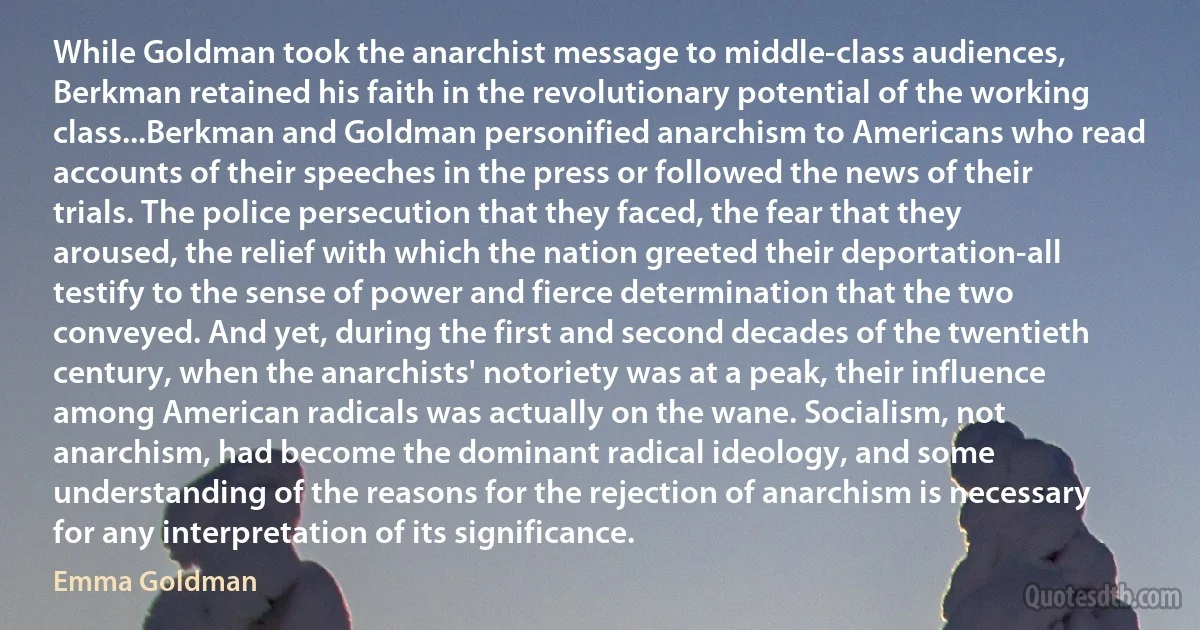
While Goldman took the anarchist message to middle-class audiences, Berkman retained his faith in the revolutionary potential of the working class...Berkman and Goldman personified anarchism to Americans who read accounts of their speeches in the press or followed the news of their trials. The police persecution that they faced, the fear that they aroused, the relief with which the nation greeted their deportation-all testify to the sense of power and fierce determination that the two conveyed. And yet, during the first and second decades of the twentieth century, when the anarchists' notoriety was at a peak, their influence among American radicals was actually on the wane. Socialism, not anarchism, had become the dominant radical ideology, and some understanding of the reasons for the rejection of anarchism is necessary for any interpretation of its significance.
Emma GoldmanRelated topics
anarchism anarchist century dominant faith fear ideology interpretation nation necessary news persecution power read second sense significance take understanding while working yet GoldmanRelated quotes
Reading conventional notions of class struggle and anti-colonialism into bin Laden, the Taliban, and radical Islam is not just solipsistic. It is nonsense. If poverty and destitution, colonialism and capitalism are animating radical Islam, explain this: In March, the Taliban went to the Afghan desert where stood great monuments of human culture, two massive Buddhas carved out of a cliff. At first, Taliban soldiers tried artillery. The 1,500-year-old masterpieces proved too hardy. The Taliban had to resort to dynamite. They blew the statues to bits, then slaughtered 100 cows in atonement-for having taken so long to finish the job. Buddhism is hardly a representative of the West. It is hardly a cause of poverty and destitution. It is hardly a symbol of colonialism. No. The statues represented two things: an alternative faith and a great work of civilization. To the Taliban, the presence of both was intolerable.

Charles Krauthammer
In fact, the only person to rival Friedman for policy influence in the twentieth century is John Maynard Keynes, who had a strikingly different view of the role of government. Keynes was influential because he advocated more government intervention into what he perceived as poorly functioning private economies caught up in the Great Depression. In contrast to Keynes, Friedman put the main blame for the Depression on government failures, especially of monetary policy. Hence, the Depression did not make Friedman a fan of big government. He also found in the Federal Reserve's failure to prevent deflation an argument in favor of monetary rules. As the world evolved- with low inflation becoming the major mission of central banks and free markets and secure property rights becoming the main policies to promote economic growth-Friedman surely won the intellectual battle.

Robert Barro
A million and a half of people spread over the Atlantic seaboard might be thought no great number; but it was a new thing in the world. ...which had in fact been carefully noted by Benjamin Franklin in a pamphlet on The Increase of Mankind, Peopling of Countries, etc.-that within three-quarters of a century the population of the continental colonies had doubled every twenty-five years, whereas the population of Old England during a hundred years past had not doubled once and now stood at only some six and a half millions. ...With these facts in mind, one might indeed say that a people with so much vitality and expansive power was abundantly able to pay taxes; but perhaps it was also a fair inference, if any one was disposed to press the matter, that unless it was so minded, such a people was already, or assuredly soon would be, equally able not to pay them.

Carl L. Becker
This option the consumer retains of being able to buy security wherever he pleases brings about a constant emulation among all the producers, each producer striving to maintain or augment his clientele with the attraction of cheapness or of faster, more complete and better justice.If, on the contrary, the consumer is not free to buy security wherever he pleases, you forthwith see open up a large profession dedicated to arbitrariness and bad management. Justice becomes slow and costly, the police vexatious, individual liberty is no longer respected, the price of security is abusively inflated and inequitably apportioned, according to the power and influence of this or that class of consumers. The protectors engage in bitter struggles to wrest customers from one another. In a word, all the abuses inherent in monopoly or in communism crop up.

Gustave de Molinari
The issues raised in the historic conflict between Charles I, resting his claim to govern Britain on the divine right of kings, and Parliament - representing, however imperfectly, a demand for the wider sharing of power - concerned the use and abuse of state power, the right of the governed to a say in their government, and the nature of political freedom. The Levellers grew out of this conflict. They represented the aspirations of working people who suffered under the persecution of kings, landowners and the priestly class, and they spoke for those who experienced the hardships of poverty and deprivation. They developed and campaigned, first with Cromwell and then against him, for a political and constitutional settlement of the civil war which would embody principles of political freedom, anticipating by a century and a half the ideas of the American and French revolutions.

Tony Benn
